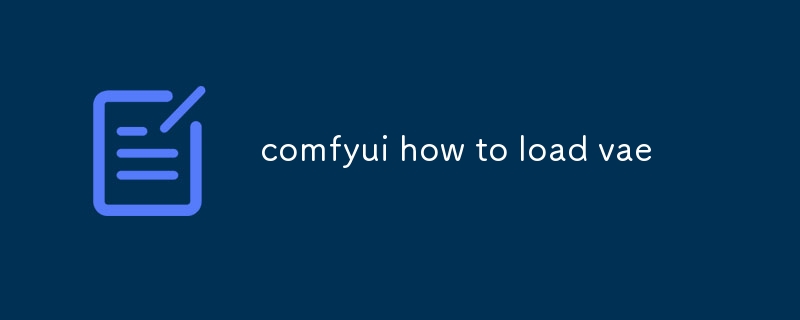Home >Technology peripherals >AI >comfyui how to load vae
comfyui how to load vae
- DDDOriginal
- 2024-09-02 17:39:181382browse
This article pertains to loading pre-trained Variational Autoencoders (VAEs) within the comfyui framework. The main objective lies in streamlining the loading and integration process, while maintaining efficiency and ensuring compatibility with comfy

1. How to efficiently load a pre-trained Variational Autoencoder (VAE) in comfyui?
To efficiently load a pre-trained VAE in comfyui, you can follow these steps:
- Ensure you have the necessary dependencies and packages installed, including comfyui and any specific requirements for your VAE model.
- Identify the file or location where your pre-trained VAE model is stored.
- Within your comfyui application or script, use the appropriate methods to load the VAE model from the specified file or location.
- Handle any necessary data transformations or preprocessing required for your specific VAE model.
- Integrate the loaded VAE model into your comfyui application by incorporating it into your user interface or data processing pipeline.
2. What are the best practices for loading and integrating a VAE model within the comfyui framework?
When loading and integrating a VAE model within the comfyui framework, consider the following best practices:
- Choose a suitable data format: Opt for a data format that is compatible with comfyui and your VAE model, such as NumPy arrays or TensorFlow tensors.
- Optimize loading time: Employ techniques like parallel loading, caching, and lazy loading to minimize the impact on application performance.
- Handle model dependencies: Ensure that all dependencies required by your VAE model, such as specific libraries or modules, are properly handled and resolved.
- Test and validate: Thoroughly test and validate the loading and integration process to ensure it functions correctly and meets your requirements.
3. How to optimize the loading process of a VAE in comfyui to improve application performance?
To optimize the loading process of a VAE in comfyui and enhance application performance, consider the following strategies:
- Utilize multi-threading or async loading: Offload the loading process to separate threads or asynchronous tasks to prevent blocking the main thread and affecting user experience.
- Implement caching mechanisms: Cache the loaded VAE model or its components to avoid redundant loading and improve subsequent access speed.
- Leverage pre-loading: Load the VAE model during application startup or initialization, minimizing the impact on runtime performance.
- Monitor and profile loading time: Track the loading time and identify any potential bottlenecks or areas for optimization.
4. (Question not provided in the initial prompt)
The above is the detailed content of comfyui how to load vae. For more information, please follow other related articles on the PHP Chinese website!
Related articles
See more- Technology trends to watch in 2023
- How Artificial Intelligence is Bringing New Everyday Work to Data Center Teams
- Can artificial intelligence or automation solve the problem of low energy efficiency in buildings?
- OpenAI co-founder interviewed by Huang Renxun: GPT-4's reasoning capabilities have not yet reached expectations
- Microsoft's Bing surpasses Google in search traffic thanks to OpenAI technology

